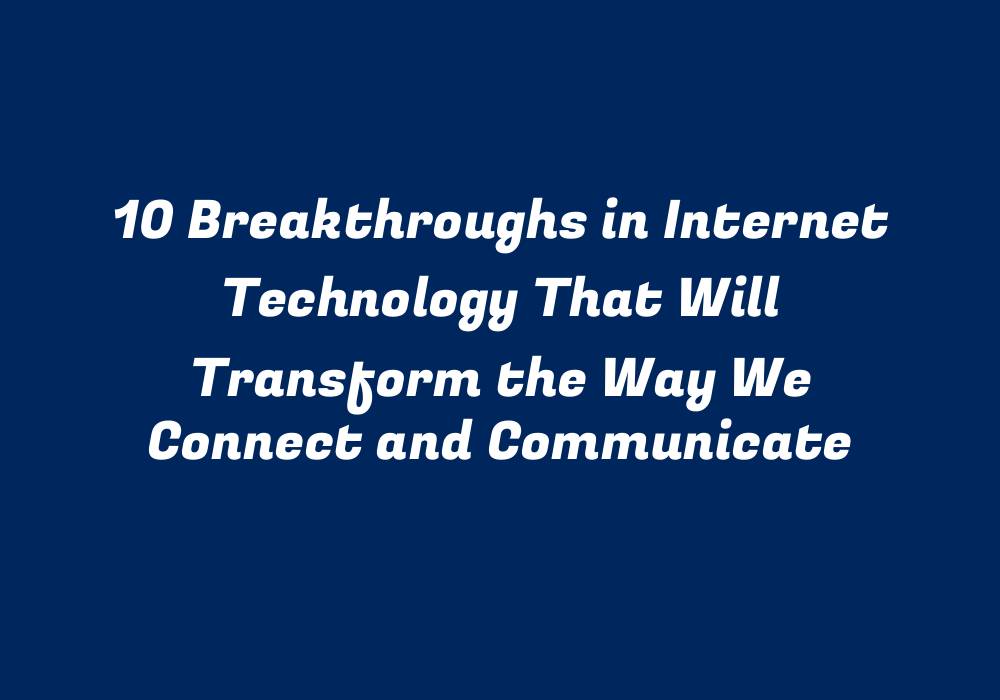10 Breakthroughs in Internet Technology Transforming Our Connections and Communication
Introduction
Internet technology continues to evolve at a fast pace, revolutionizing our daily lives and the ways we interact with each other. This evolution has made it easier for people from around the globe to communicate, collaborate, and connect like never before. In this article, we will explore ten breakthroughs in internet technology that are shaping the future of online communication.
1. 5G Technology: Faster Internet Speeds and Enhanced Connectivity
The rollout of 5G networks is one of the most significant advancements in internet technology to date. This next-generation cellular network promises higher data transfer speeds, lower latency, and improved network capacity. With 5G, we can expect real-time video streaming, augmented reality experiences, and enhanced smartphone capabilities that were once just dreams.
2. Artificial Intelligence (AI): Enhanced Internet Experience
Artificial intelligence has made its way into various aspects of internet technology, from search engines like Google to social media platforms like Facebook. AI-powered tools have revolutionized how we discover information, analyze data, and engage in communication online. As AI evolves, it will continue to improve our online experience by providing more accurate recommendations, faster data analysis, and better customer service.
3. Virtual Reality (VR): Immersive Communication Experiences
Virtual reality technology has opened up new opportunities for connecting with others through immersive experiences. Platforms such as Facebook’s Horizon Workrooms and Microsoft Mesh enable people to work and interact in virtual spaces, irrespective of their physical locations. This breakthrough promises to revolutionize remote work, education, and social interaction by making it possible to share 3D environments with others.
4. Blockchain Technology: Secure and Decentralized Data Storage
Blockchain technology has disrupted various industries, including finance and supply chain management, but its potential in the internet realm is vast as well. This decentralized ledger system guarantees secure data storage by recording transactions across multiple computers. It could pave the way for more trustworthy online interactions, particularly in fields like digital identity verification, content creation, and information sharing.
5. Internet of Things (IoT): Connecting Devices to the Web
The Internet of Things refers to the interconnection of devices, vehicles, and other items embedded with sensors that enable them to collect and exchange data. IoT has already transformed various aspects of our lives, from smart home appliances to connected wearable technology. As IoT continues to develop, it will further expand how we interact with everyday objects and improve remote monitoring capabilities.
6. Edge Computing: Processing Data Closer to the Source
Edge computing decentralizes the processing of data by moving computational tasks from centralized servers to the network’s edge – closer to where the data is being generated. This approach reduces latency, improves performance, and enhances security. As more devices become connected through IoT, edge computing will become increasingly crucial for handling massive amounts of real-time data and ensuring a smooth online experience.
7. Cloud Computing: Infinite Storage and Elastic Computing Resources
Cloud computing has revolutionized the way businesses handle their IT resources by enabling them to store, manage, and process information in virtual environments. This technology offers unlimited storage capacity and scalable processing power, allowing users to access files and applications from anywhere with an internet connection. Cloud-based platforms like Google Drive and Microsoft Azure have become ubiquitous in both personal and professional settings.
8. Quantum Computing: Revolutionizing Data Processing Speed and Capabilities
Quantum computing is a promising new approach to processing data that leverages quantum physics principles such as superposition and entanglement. This technology has the potential to solve complex problems much faster than traditional computers, making it useful for fields like AI research, drug discovery, and cryptography. As quantum computing continues to evolve, we could see significant advancements in online communication and data processing.
9. Cryptocurrency and Blockchain Technology: Secure Transactions and Financial Independence
Cryptocurrencies and blockchain technology have the potential to disrupt traditional financial systems by enabling decentralized transactions without intermediaries like banks or governments. This breakthrough promises a more secure and transparent means of exchange, lower transaction fees, and increased accessibility for individuals in developing countries who lack conventional banking services.
10. Online Privacy and Security Measures: Protecting User Data
As internet technology continues to advance, so do the threats to user privacy and data security. Technological innovations are being developed that aim to safeguard users’ personal information while they interact online. Encrypted communication tools like Signal and advanced firewalls provide users with more control over their digital identities and ensure a safer online experience.
Conclusion
These groundbreaking advancements in internet technology will continue to transform the way we connect, collaborate, and communicate with one another. With each breakthrough, we find ourselves closer to a future where our interactions are faster, more secure, and more immersive than ever before. As these innovations develop further, it is exciting to envision how they will shape our world and revolutionize the way humans engage on a global scale.
